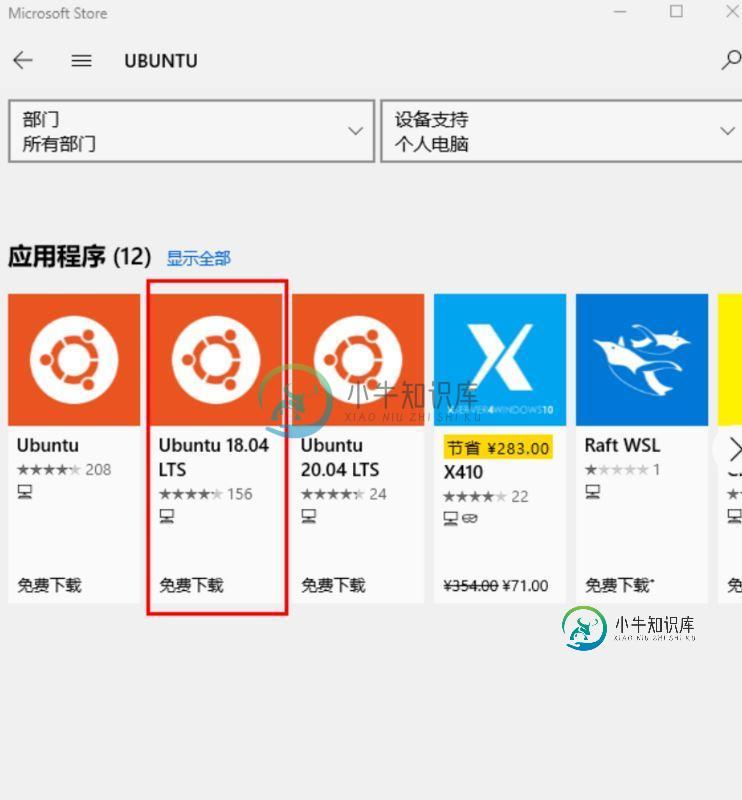如何使用win10内置的linux系统启动spring-boot项目
1.安装win10内置linux子系统
1.1.安装linux子系统
1.1.1.升级或者重装linux系统
1.系统要求
需要升级win10到一周年纪念版,或者 重装系统
2.重装系统
笔者结果测试发现下面的系统重装后可以启用linux子系统
cn_windows_10_enterprise_version_1607_updated_jul_2016_x64_dvd_9057083.iso
cn_windows_10_multi-edition_vl_version_1709_updated_sept_2017_x64_dvd_100090774.iso
1.1.2.启用linux子系统
step1.启用开发人员模式
(16215版之后不再需要开发人员模式)
设置-->更新和安全-->针对开发人员

step2.启用linux子系统
控制面板-->程序和功能-->启用或关闭windows功能

1.1.3.在线安装ubuntu系统
打开Microsoft Store安装ubuntu系统

1.1.4.离线安装ubuntu系统
下载安装包,下载自己想要安装的Linux系统。
参考链接:https://docs.microsoft.com/en...
下载Ubuntu 16.04.
Invoke-WebRequest -Uri https://aka.ms/wsl-ubuntu-1604 -OutFile Ubuntu.appx -UseBasicParsing
也可以使用curl下载,但是需要先安装curl
curl.exe -L -o ubuntu-1604.appx https://aka.ms/wsl-ubuntu-1604
安装
Add-AppxPackage .\app_name.appx
1.1.5.启动ubuntu系统
启动ubuntu系统
安装完成后打开搜索菜单,输入系统名字搜索启动

输出需要设置的用户和密码

你相信吗,仅仅只有15.4MB

安装目录
C:\Users\Administrator\AppData\Local\Packages\CanonicalGroupLimited.Ubuntu20.04onWindows_79rhkp1fndgsc
home目录
C:\Users\Administrator\AppData\Local\Packages\CanonicalGroupLimited.Ubuntu20.04onWindows_79rhkp1fndgsc\LocalState\rootfs\home
1.2.开启ssh-server
1.2.1.相互复制文件
ubuntu的bash窗口窗与在xshell不同,通过shift+v无法黏贴,并且在输入界面鼠标右键无法使用。粘贴文件的方法如下
右击标题栏==> Edit(编辑) ==> Mark/Paste(标记并复制/粘贴)操作

这样还是很麻烦,可以调整对话框,在弹出的菜单中有一个Properties对话框属性菜单,点击进入下图

勾选快速编辑、快速插入模式,这两种模式支持鼠标右键选中,左键黏贴操作。
最后,最好的方式是,在ubuntu上启动ssh服务,通过xshell连接上操作会更好。
1.2.2.修改apt源
参考链接
https://developer.aliyun.com/...
用你熟悉的编辑器打开:
/etc/apt/sources.list
替换默认的archive.ubuntu.com为mirrors.aliyun.com
修改后的内容
ubuntu18.04
deb http://mirrors.aliyun.com/ubuntu/ bionic main restricted universe multiverse
deb-src http://mirrors.aliyun.com/ubuntu/ bionic main restricted universe multiversedeb http://mirrors.aliyun.com/ubuntu/ bionic-security main restricted universe multiverse
deb-src http://mirrors.aliyun.com/ubuntu/ bionic-security main restricted universe multiversedeb http://mirrors.aliyun.com/ubuntu/ bionic-updates main restricted universe multiverse
deb-src http://mirrors.aliyun.com/ubuntu/ bionic-updates main restricted universe multiversedeb http://mirrors.aliyun.com/ubuntu/ bionic-proposed main restricted universe multiverse
deb-src http://mirrors.aliyun.com/ubuntu/ bionic-proposed main restricted universe multiversedeb http://mirrors.aliyun.com/ubuntu/ bionic-backports main restricted universe multiverse
deb-src http://mirrors.aliyun.com/ubuntu/ bionic-backports main restricted universe multiverse
ubuntu 20.04(focal)
deb http://mirrors.aliyun.com/ubuntu/ focal main restricted universe multiverse
deb-src http://mirrors.aliyun.com/ubuntu/ focal main restricted universe multiversedeb http://mirrors.aliyun.com/ubuntu/ focal-security main restricted universe multiverse
deb-src http://mirrors.aliyun.com/ubuntu/ focal-security main restricted universe multiversedeb http://mirrors.aliyun.com/ubuntu/ focal-updates main restricted universe multiverse
deb-src http://mirrors.aliyun.com/ubuntu/ focal-updates main restricted universe multiversedeb http://mirrors.aliyun.com/ubuntu/ focal-proposed main restricted universe multiverse
deb-src http://mirrors.aliyun.com/ubuntu/ focal-proposed main restricted universe multiversedeb http://mirrors.aliyun.com/ubuntu/ focal-backports main restricted universe multiverse
deb-src http://mirrors.aliyun.com/ubuntu/ focal-backports main restricted universe multiverse
更新
apt-get update
1.2.3.启用ssh
1.安装ssh
apt-get -y install openssh-server
2.修改配置文件,一般不需要修改
cp /etc/ssh/sshd_config /etc/ssh/sshd_config.bak vi /etc/ssh/sshd_config
# 修改端口号,避免和 Windows ssh 服务端口冲突 Port 2222 #StrictModes yes # 注释 # 使用密码登录 PasswordAuthentication yes # 允许使用 root 用户登录 PermitRootLogin yes
3.设置root账号密码
sudo -s passwd root
4.启动ssh
service ssh start
5.如果提示“sshd error: could not load host key”,则用下面的命令重新生成
rm /etc/ssh/ssh*key dpkg-reconfigure openssh-server
使用xshell连接127.0.0.1输入账号和密码即可
1.2.4.配置PS1变量
自行百度什么事linux的PS1变量
export PS1="\[\e[1;32;40m\][\u@\h \W]\\$ \[\e[m\]"
2.搭建开发环境
2.1.搭建java开发环境
2.1.1.安装java和maven
mkdir /usr/java tar -xf jdk-8u211-linux-x64.tar.gz -C /usr/java/ mdkir /usr/maven tar -xf litongjava-apache-maven-3.3.9.tar.gz -C /usr/maven/
配置环境变量
export JAVA_HOME=/usr/java/jdk1.8.0_211 export M2_HOME=/usr/maven/apache-maven-3.3.9 export PATH=$JAVA_HOME/bin:$M2_HOME/bin:$PATH
配置maven使用windows的maven本地库目录,maven本地库在linux中对应的目录是/mnt/d/dev_mavenRepository/
settings.xml的内容如下
cat /usr/maven/apache-maven-3.3.9/conf/settings.xml <?xml version="1.0" encoding="UTF-8"?> <settings xmlns="http://maven.apache.org/SETTINGS/1.0.0" xmlns:xsi="http://www.w3.org/2001/XMLSchema-instance" xsi:schemaLocation="http://maven.apache.org/SETTINGS/1.0.0 http://maven.apache.org/xsd/settings-1.0.0.xsd"> <localRepository>/mnt/d/dev_mavenRepository/</localRepository> <pluginGroups> </pluginGroups> <proxies> </proxies> <servers> </servers> <mirrors> <mirror> <id>aliyun</id> <name>aliyun</name> <mirrorOf>*</mirrorOf> <url>https://maven.aliyun.com/repository/public</url> </mirror> </mirrors> <profiles> </profiles> </settings>
2.1.2.打包和启动spring-boot项目
进行项目目录执行下面的命令打包项目
mvn clean package -DskipTests
进入target目录启动项目
cd target/
java -jar *.jar
可以明显的看出,java程序使用了近1G的内存

总结
到此这篇关于如何使用win10内置的linux系统启动spring-boot项目的文章就介绍到这了,更多相关win10 linux启动spring-boot项目内容请搜索小牛知识库以前的文章或继续浏览下面的相关文章希望大家以后多多支持小牛知识库!
-
Linux 系统的启动,从计算机开机通电自检开始,一直到登陆系统,需要经历多个过程。学习 Linux 的启动过程,有助于了解 Linux 系统的结构,也对系统的排错有很大的帮助。 CentOS 6.x 系统启动过程发生了较大的变化,使用 Upstart 启动服务取代了原先的 System V init 启动服务。Upstart 启动服务的效率更高,启动速度更快。 Linux 系统启动过程比较复杂,
-
我正在创建一个简单的spring-boot项目,方法是http://start.spring.io并选择web和执行器作为依赖项。我的spring-boot版本是1.5.2.RELEASE。项目下载到我的本地计算机。然后解压缩项目并将其作为maven项目导入到我的工作区。我使用spring STS IDE(我认为这无关紧要,但我只是想提一下)。我确实在我的项目中看到错误。显然这是一个构建路径问题,
-
本文向大家介绍Spring Boot 启动端口如何启动,包括了Spring Boot 启动端口如何启动的使用技巧和注意事项,需要的朋友参考一下 Spring Boot 启动端口 Spring Boot 其默认是集成web容器的,启动方式由像普通Java程序一样,main函数入口启动。其内置Tomcat容器或Jetty容器,具体由配置来决定(默认Tomcat)。当然你也可以将项目打包成war包,放到
-
问题内容: 根据man signal(7),如果在安装信号处理程序时使用了该标志,则可以通过内核透明地重新启动某些系统调用: 如果信号处理程序中断了对以下接口之一的阻塞调用, 则如果使用了SA_RESTART标志,则在信号处理程序返回后 , 该调用将自动重新启动 ;否则,调用将失败,并显示错误EINTR: 然后,它提到了一些可以(也不能重启)的系统调用,但是在任何地方都没有提到,我怎么知道或者任何
-
问题内容: 假设我有一个要运行的Docker容器,那么我可以调用 一切都很好。如果系统崩溃并重新启动,是否有内置的方式来运行容器,使其能够自动重新启动? 如果是这样,这在Docker Compose中也可用吗? 问题答案: 是的,docker具有重启策略,该策略可以处理此问题。这也可以在compose.yml配置文件中找到。
-
假设我有一个要运行的Docker容器,然后我可以调用 一切都很好。是否有一种内置方法可以运行容器,以便在系统崩溃并重新启动时自动重新启动容器? 如果是这样,这在 Docker Compose 中是否也可用?

